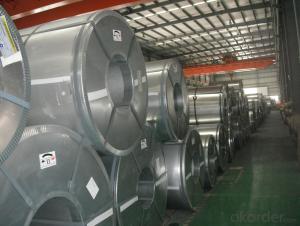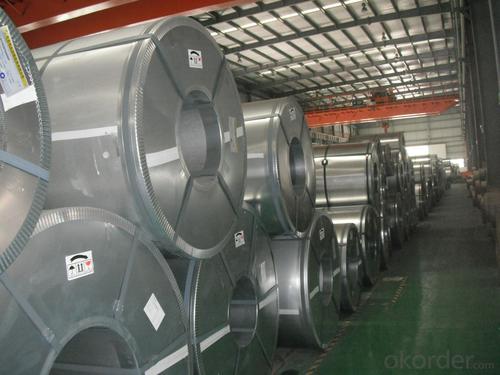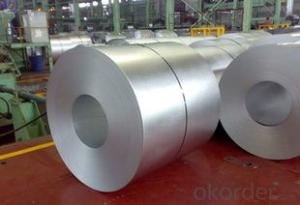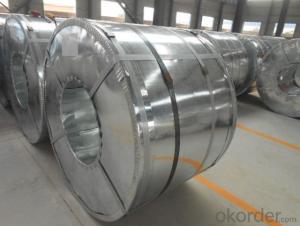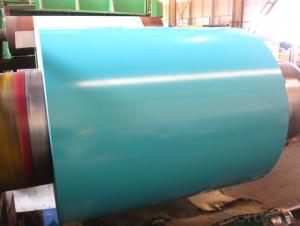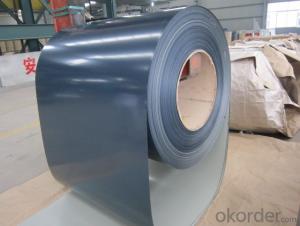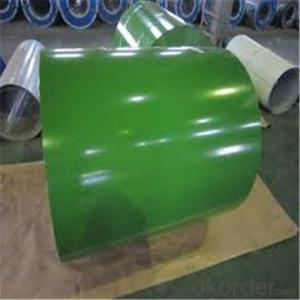Prime Hot Dipped Aluzinc Steel Sheet In Coils
- Loading Port:
- Shanghai
- Payment Terms:
- TT OR LC
- Min Order Qty:
- 100 m.t.
- Supply Capability:
- 20000 m.t./month
OKorder Service Pledge
OKorder Financial Service
You Might Also Like
Prime Hot Dipped Aluzinc Steel Sheet In Coils
1.Structure of Prime Hot Dipped Aluzinc Steel Sheet In Coils
Prime Hot Dipped Aluzinc Steel Sheet In Coils is one kinds of building material on construction.Steel sheet in melting zinc trough, the sticking of a layer of zinc sheet. At present mainly adopts continuous galvanizing process, namely the continuous roll of steel plate in the melt zinc plating tank made of galvanized steel sheet; Alloying of galvanized steel. This kind of steel plate is made by hot dip method, but after the slot, immediately heated to a temperature of about 500 ℃, it make the generation of zinc and iron alloy membrane. This kind of galvanized volumes with good coating of the sex and weldability.
2.Main Features of Prime Hot Dipped Aluzinc Steel Sheet In Coils.
1) Rust-proof
2) Water-proof
3)Durable using
3. Prime Hot Dipped Aluzinc Steel Sheet In Coils Images
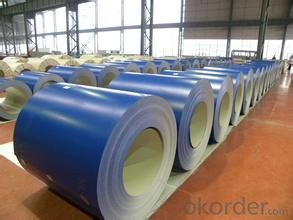
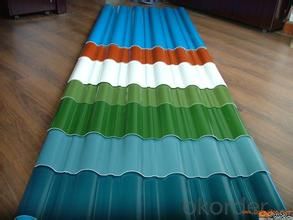
4. Prime Hot Dipped Aluzinc Steel Sheet In Coils Specification
1)Based raw material: Hot rolled steel coils or Cold rolled steel coils
2) Thickness
3) Width
4)Coating mass
5) Spangle
6)Surface treatment
7)Coil inner diameter
8)Painting kind
9)Painting color
10)Painting thickness
5.FAQ of Prime Hot Dipped Aluzinc Steel Sheet In Coils
We have organized several common questions for our clients,may help you sincerely:
①How about your company?
A world class manufacturer & supplier of castings forging in carbon steel and alloy steel,is one of the large-scale professional investment casting production bases in China,consisting of both casting foundry forging and machining factory. Annually more than 8000 tons Precision casting and forging parts are exported to markets in Europe,America and Japan. OEM casting and forging service available according to customer’s requirements.
②How to guarantee the quality of the products?
We have established the international advanced quality management system,every link from raw material to final product we have strict quality test;We resolutely put an end to unqualified products flowing into the market. At the same time, we will provide necessary follow-up service assurance.
③How is the packaging and delivery?
Exporting Package with the steel material cover and the delivery term is based on the project.
- Q: How are steel coils inspected for thickness?
- Steel coils are inspected for thickness using various methods to ensure their quality and compliance with industry standards. One common method is using a non-contact laser measurement system. In this process, a laser beam is directed towards the surface of the steel coil, and the time it takes for the beam to reflect back is measured. By accurately calculating the time taken, the thickness of the steel coil can be determined. Another method involves using ultrasonic technology. Ultrasonic sensors are used to emit high-frequency sound waves that penetrate the coil. These sound waves bounce back differently depending on the thickness of the steel, allowing the sensors to measure the thickness accurately. Additionally, some manufacturers may opt for an eddy current testing method. This technique involves passing an alternating current through a coil, creating a magnetic field. The thickness of the steel coil affects the impedance of the coil, which can be measured. By analyzing the changes in impedance, the thickness of the steel coil can be evaluated. Furthermore, some companies employ a mechanical method called the caliper method. This method involves using a caliper gauge to physically measure the thickness of the steel coil by applying pressure to the coil and reading the measurement on the caliper. Regardless of the method used, it is crucial for steel coils to be inspected for thickness to ensure they meet the required specifications and provide the desired performance in various applications.
- Q: Can steel coils be coated with scratch-resistant materials?
- Yes, steel coils can be coated with scratch-resistant materials. These materials are designed to provide an additional layer of protection to the steel surface, minimizing the risk of scratches or damage during handling, transportation, or storage.
- Q: What are the common applications of steel coils in construction?
- Steel coils are commonly used in construction for various applications such as roofing, siding, structural framework, and reinforcement in concrete structures.
- Q: How are steel coils used in the production of metal panels?
- Steel coils are an essential component in the production of metal panels. These coils, which are typically made from high-quality steel, serve as the raw material for manufacturing various types of metal panels. To begin the production process, the steel coils are first unrolled and flattened using specialized machinery. This allows for a consistent and uniform thickness throughout the sheet. The flattened steel is then cut into the desired length and width, depending on the specific requirements of the metal panel being produced. Once the steel has been cut, it undergoes further processing, such as cleaning and coating. This is done to remove any impurities and protect the steel from corrosion or damage. The coating also enhances the appearance of the metal panel and provides additional durability and longevity. After the cleaning and coating process, the steel sheets are formed into the desired shape using various techniques, such as roll forming or stamping. This allows for the creation of different types of metal panels, including roofing panels, wall panels, and decorative panels, among others. The steel coils used in the production of metal panels are chosen for their strength, durability, and versatility. Steel is known for its excellent structural properties, making it an ideal material for constructing sturdy and long-lasting metal panels. Additionally, steel is highly resistant to environmental factors, such as extreme weather conditions, which further enhances the durability of the metal panels. In conclusion, steel coils play a crucial role in the production of metal panels. They serve as the raw material for manufacturing these panels and undergo various processes to ensure their quality and durability. The use of steel coils allows for the production of a wide range of metal panels that can be used in various industries and applications.
- Q: How are steel coils labeled and identified?
- Steel coils are typically labeled and identified using various methods such as tags, stickers, or printed markings. These labels usually contain important information including the coil's dimensions, weight, grade, manufacturer, and any specific customer requirements. Additionally, unique identification numbers or barcodes may be used for easy tracking and inventory management.
- Q: How are steel coils protected from corrosion?
- Steel coils are protected from corrosion through a process called galvanization, where a protective layer of zinc is applied to the surface of the steel. This zinc coating acts as a barrier, preventing moisture and oxygen from coming into direct contact with the steel, thus inhibiting the formation of rust and corrosion.
- Q: How are steel coils used in the production of automotive frames?
- Steel coils are used in the production of automotive frames as they provide the necessary strength and durability. These coils are typically formed into specific shapes and sizes, which are then welded together to create the frame structure. The high tensile strength of steel coils ensures that the automotive frame can withstand the various stresses and strains experienced during vehicle operation, ensuring safety and stability.
- Q: Ok.. I was wondering if it's possible for me to recycle baked bean cans (steel)? And if so in Western Australia (that's where I live)?I love baked beans... and I also like skateboarding, so I thought if I kept my baked bean cans, that I could get them recycled somewhere and turn it into something I could skate on (rail, etc.). I'm just curious to know if all this is possible...Cheers. :)
- Most baked beans are cooked with pork and include a piece in the can. Depending on what kind of vegetarian you are, you could eat them and simply remove the piece of pork, or, Bush's has vegetarian baked beans which are obviously cooked without the meat seasoning. They are very good, and of course beans are an excellent and needed source of protein in a vegetarian diet.
- Q: what do we use steel for and whyand why do we use brass for instrumentsplz help its homework and i cant find the answer anywhere : (
- Brass and steel are type of metals that mostly use for moist area and also have luxury used cause of ability of shine .Steel definitely is for anti oxide ,mostly use in area that food and liquid such as acid ,milk ,soda,water are in contact .Brass most use for electric parts and decoration for ability of conductivity and shin .
- Q: What are the common transportation defects in steel coils?
- Common transportation defects in steel coils may include edge damage, surface scratches, deformation, and coil slippage. These defects can occur due to mishandling during loading, unloading, or transit, leading to potential quality issues and compromised structural integrity of the steel coils.
Send your message to us
Prime Hot Dipped Aluzinc Steel Sheet In Coils
- Loading Port:
- Shanghai
- Payment Terms:
- TT OR LC
- Min Order Qty:
- 100 m.t.
- Supply Capability:
- 20000 m.t./month
OKorder Service Pledge
OKorder Financial Service
Similar products
Hot products
Hot Searches
Related keywords
